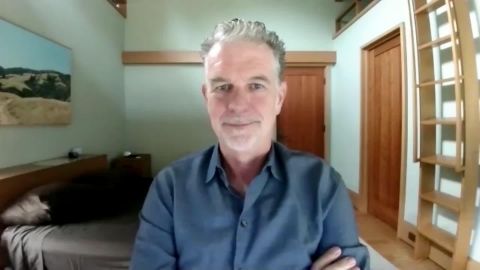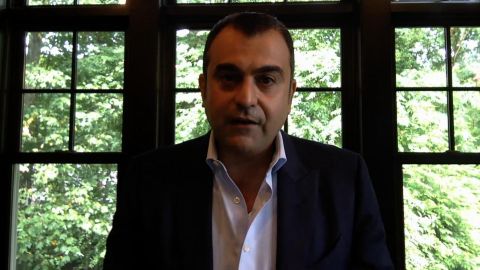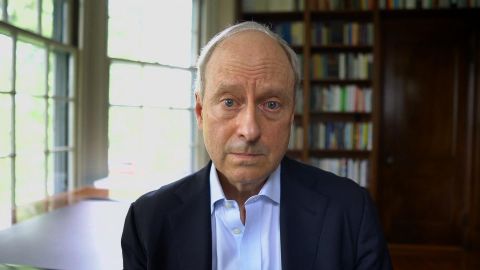Read Transcript EXPAND
CHRISTIANE AMANPOUR: And, now, if you have been binge-watching your way through this pandemic, you are not alone. Business is booming for Netflix, which added a whopping 10 million users in this year second quarter. Our next guest, Reed Hastings, is the co-founder and co-CEO of Netflix. He says the secret of their success is a smash-the-conventions culture. And he’s written about it in a new book called “No Rules Rules.” Here he is talking to our Walter Isaacson about that and about why he’s not worried about young people becoming video addicts.
WALTER ISAACSON: Thank you, Christiane. And, Reed, welcome to the show.
REED HASTINGS, CEO, NETFLIX: A real treat, Walter. Thank you.
ISAACSON: You have just come out with a book called “No Rules Rules.” It’s based on a slideshow you once did on a reinvention, how to create a culture of reinvention. Part of it is only having A players, as Steve Jobs would say. Explain that to me.
HASTINGS: Well, the book is really about employee freedom. More than most companies, we try to create a climate where employees can make decisions, including impactful, big decisions. And it’s a whole system around, how do you have great employee freedom, no rules and not have chaos? Because the benefit is that you get great flexibility and adaptation. Now, you asked about, how do you have great players, hiring A players? Everyone tries to hire A players. That’s pretty consistent across many companies. What they don’t do or do unevenly is let people go. And what we say is, we’re a team, like a professional sports team, not like a family. We want great players in every position, because that’s the only way we have a chance of winning the championship, of pleasing our members around the world with incredible entertainment.
ISAACSON: You say that there should be no rules, so that people can flourish, set their own rules and do their things. What happens during a pandemic, when people aren’t coming into the office? Is that a problem?
HASTINGS: It’s worked as well as you can. It’s not as good as being together in person. But our employees have sacrificed tremendously to do their work. It’s been so hard for those who live alone or those who have young kids at home, and they really leaned in. But, like everyone, I can’t wait until this COVID thing is done.
ISAACSON: How has the coronavirus pandemic affected Netflix’s way of doing business?
HASTINGS: We’re doing all the things that everyone else is doing, is living on videoconferences and getting through it. But the big thing is, when people are locked up at home, they really would need great entertainment. They want to escape. And so we have been very fortunate to grow. In the first half of the year, we grew from about 170 million to about 195 million households subscribing to Netflix. So we have been very fortunate, like Home Depot or Amazon, that, in this crisis, our business has increased.
ISAACSON: You have talked about competition. Who is your real competition? And what sideways threats, to use a phrase in your book, do you worried about?
HASTINGS: You know, what we have really talked about internally with our employees is, we’re really good at executing on the current business. And Disney+ is also really good at Disney. And we will both do really well, as we have great models. But the dangerous threats are often the subtle substitutes, say that TikTok continues growing for five or 10 years or YouTube and that they do more and more professional-like entertainment, or video gaming companies do more longer form, where there’s real story in there, and become very compelling. So, we can be outcompeted by non-premium entertainment companies just as well as we can be outcompeted by premium entertainment.
ISAACSON: How did you and Ted Sarandos, co-CEO, decide at some point you were going to be a content business?
HASTINGS: Well, we had always been an entertainment business right from the beginning, when we started on DVD by mail. And what our book shows is how you can evolve. Our particular evolution was DVD to streaming. But every business faces that, if you really invest in the openness and the flexibility of culture. I mean, Blockbuster was actually a very well-run company that was the best in the world at video stores. And then they just couldn’t make the leap to going into streaming. So, this can happen to almost any company. And what the book really illustrates is, you want to be preparing for that long in advance.
ISAACSON: And tell us about that somewhat famous meeting you had with the Blockbuster CEO. And what did you learn from that meeting?
HASTINGS: What I learned is how hard it is to see emerging threats. We were an emerging threat. They definitely didn’t see that. And it was only 10 years later when they were bankrupt, and we were grown, that everyone else could see it.
ISAACSON: And I think was one of my former bosses, Jeff Bewkes, said something that he wasn’t going to worry about you. You were like the Albanian army. Were a lot of people who didn’t see the threats?
HASTINGS: Yes. And in Jeff Bewkes’ case, it’s most interesting because very sophisticated guy, very thoughtful. And he was the one with the AOL/Time Warner merger that had been against it. He was the one that saved the company afterwards, because he saw correctly at that time that the Internet was bunked. But what happens is, yes, it was at that time, in the year 2000. But, 20 years later, the Internet is really capable of television. So, sometimes, you overlearn one lesson that, 10 years later, there’s a different answer to.
ISAACSON: You have recently gotten more into nonfiction as well. Was that something that surprised you that it turned out to be a good line of work?
HASTINGS: I mean, “Tiger King,” “The Last Dance” with Michael Jordan we did with ESPN, there’s so many great nonfiction stories, “Indian Matchmaking” another amazing one. So, no, we always thought we would expand into that, just as we have into stand-up comedy, frankly, into film, because we started on original series only. So, we’re now covering the gamut. And one of the big challenges ahead is, can we get better than Disney at family animation? So they have had 100 years. That’s their core. And for us to get better than them, we hope over five 10 years, will be quite a challenge. But those are the kind of ambitious challenges that we love.
ISAACSON: When you look at the differences, experiences and you try to make people come together, sometimes, the cultures are so divisive or so different. And you have had to make some accommodations, especially in Saudi Arabia at one point on a comedy series. To what extent do you want to make those accommodations and make sure everybody can be in the tent with you? And to what extent do you want to make sure you’re sharing visions?
HASTINGS: It’s really extraordinary, around the world, the content that we’re able to carry. Broadcast television in most countries around the world is highly regulated and quite constrained. And we have got shows like “Queer Eye” and “Sex Education” and “Orange Is the New Black” on our service in Indonesia, in Saudi Arabia, all over the world. So, when you’re dealing in fiction, you really get license to explore, again, different worlds. And that’s what really helps people grow and connect.
ISAACSON: What’s coming up with the deal that you have with Barack Obama?
HASTINGS: Oh, well, we have an overall production deal with Barack and Michelle Obama. And you saw Michelle’s documentary “Becoming.” Their film “American Factory” won an Oscar last year. So you have seen lots of great work from them, again, not political, really human interest. And then we just did another big deal with Prince Harry and Meghan Markle, and same kind of thing. We want to do broadly entertaining things that really bring people together to see a new story.
ISAACSON: You moved some of your money into black-owned banks. And I know you’re friends with Bill Bynum. You have worked with him through the Aspen Institute and other places. To what extent do you see corporations having a role to play in this period, where we’re wrestling with civil rights, in order to say, here’s where we stand?
HASTINGS: Well, in the United States, we have a tremendous gap between average black family wealth and average white family wealth, about a tenfold gap. And part of that is legacy of slavery and Jim Crow and many other things. And black banks, because they back blank businesses and families, don’t have as much money. And so by putting 1 or 2 percent of every company’s assets, depositing them in black banks, we increase the capital in black banks, which increases the lending, which grows the economy, and we can start to close the wealth gap between black and white families. And when you close the wealth gap, you start to close the power gap.
ISAACSON: And how might you be doing that with your product from Netflix?
HASTINGS: You know, our product is really for entertainment. So we have “BlackAF” from Kenya Barris. And it’s a hilarious, but also sort of social commentary title. Or we have “13th” by Ava DuVernay about the history of mass incarceration. So we have a broad range of content. But our fundamental aspect as Netflix is to be incredibly entertaining.
ISAACSON: One of the things I have known about you that’s probably not as well-known is how you deeply study values. You love these seminars and ways of discussing values with people. To what extent have your values influenced the type of things you do, both in business and in the content you create?
HASTINGS: Well, I think having a clear sense of your own values and your firm’s values are really important. And with our employees, we have developed clarity around that about what we want to represent to consumers and what we don’t. We’re not in sports, even though sports is very enjoyable. We’re not in video games, even though that’s very enjoyable. We’re not in news, even though that’s very important. So we’re really focused on series and films and trying to be the absolute best in the world at it, and then to grow to be able to entertain the whole world. That would be such an accomplishment.
ISAACSON: And one of those things that you said at one point that you weren’t into was that it wasn’t your role to be telling truth to power. Was that a little bit of an overstatement? And have you rethought that?
HASTINGS: Well, one version of truth to power is, that’s when you have real journalists that sometimes go to jail, sometimes are killed. Journalism’s a super serious business. So, what we do is, certainly, there’s truth in all entertainment. And there’s aspects of truth to power, but I don’t want to pretend that what we do is as dangerous or as important as journalism.
ISAACSON: One of the rules that you have in your great new book involves humility, which is that you should never crow about any success you may have had. And you also, when you make mistakes, you should be up front and talk about those. To what extent have you talked openly about certain mistakes you have made?
HASTINGS: Well, within the company, we’re very big on that of sharing things that could be better, not for the purpose of humiliation or something negative, but from the sense of learning and growth. We learn the most when people give us feedback. And the funny thing is, even for me, with all this success, when someone gives me negative feedback, it still hurts. It’s — and then I try to remember, oh, it’s like doing crunches or pushups. And I know those last ones hurt, but those are the ones that make you strong. And it’s the same thing with feedback. And so I’m better now at just absorbing the feedback, feeling the pain still, but recognizing, that’s what makes me better.
ISAACSON: You write in your book about your wonderful mother and the family you grew up in, but being in a household in which emotions weren’t really discussed that much. And then you talk about your early marriage and being in couples training. To what extent does that inform the way you operate and the way you wrote these rules for Netflix?
HASTINGS: Growing up, I was a typical restrained family, or maybe that was just my orientation. And I write in the book that I learned a lot about honesty from our marriage counselor, which he really helped me see that I was systematically lying. I would say things like, family is the most important thing, and then I would stay at work late at night. And he helped me to see that this was bad for me, and I should really learn to be very honest and self-reflective and self-aware. And that has helped tremendously in my marriage. And we just celebrated our 29th wedding anniversary. But, surprisingly, it’s also helped a lot at Netflix. And, as a leader, I realize, if I can set a good example of being honest and open and curious, then we will attract people like that, and then the whole company can grow, as we have from DVD by mail, to streaming to original content.
ISAACSON: You’re a longtime board member at Facebook. You’re friends with Sheryl Sandberg and to some extent Mark Zuckerberg. Do you ever talk to them about the values you adhere to and how Facebook might, in some ways, either intentionally or unintentionally, be undermining some of those values?
HASTINGS: Well, Mark and Sheryl take their responsibilities very seriously. And they’re definitely wrestling with the effects in society. And every new technology that’s important has downsides. And they and the society, Twitter, YouTube, all the user-generated — TikTok — are wrestling with, how do you mostly be for the good and mitigate the bad?
ISAACSON: But the algorithms you build in to your system help people connect with the entertainment they like the most. The algorithms in a place like Facebook tend to reinforce and at times inflame or enrage people. Do you think it’s not just a small problem, but a systemic flaw in the way some of these social media sites are built?
HASTINGS: It’s a challenge that they have. And, really, they’re the ones you should probably ask about that, because we get the joy of just focusing on our members and sort of, in some sense, an easier problem, which is, how do you give people great entertainment that they’re going to rave about?
ISAACSON: And how much do you worry about the amount of time especially young people these days are spending online and how the algorithms for all types of online things tend to be addictive in a way?
HASTINGS: When you think about the roots of television and the beginning of TV, people used to say in the 1960s, oh, TV is awful, it’s going to wreck society. That didn’t happen. Before that, it was rock ‘n’ roll was going to wreck society. So I have a lot of confidence that youth will learn how to adapt and become digital natives, and all of these things will be channeled to the positive.
ISAACSON: What rules did you have for your kids?
HASTINGS: The book that we’re launching today, it’s called “No Rules Rules,” so you can guess I’m not a big person for rules. I’m a big person for principles and understanding and experiences. So, we had very few. I can’t think of any rules for our kids, but they did grow up 15 years ago, so it was an easier time than today.
ISAACSON: Reed, thanks so much for joining us.
HASTINGS: Walter, what a pleasure.
About This Episode EXPAND
Former FBI agent Ali Soufan joins Christiane to discuss his declassified memoir “The Black Banners.” Celebrated philosopher Michael Sandel explains how meritocracy devalues the contributions of the working class. Netflix CEO Reed Hastings tells Walter Isaacson his principles in running a successful business.
LEARN MORE


